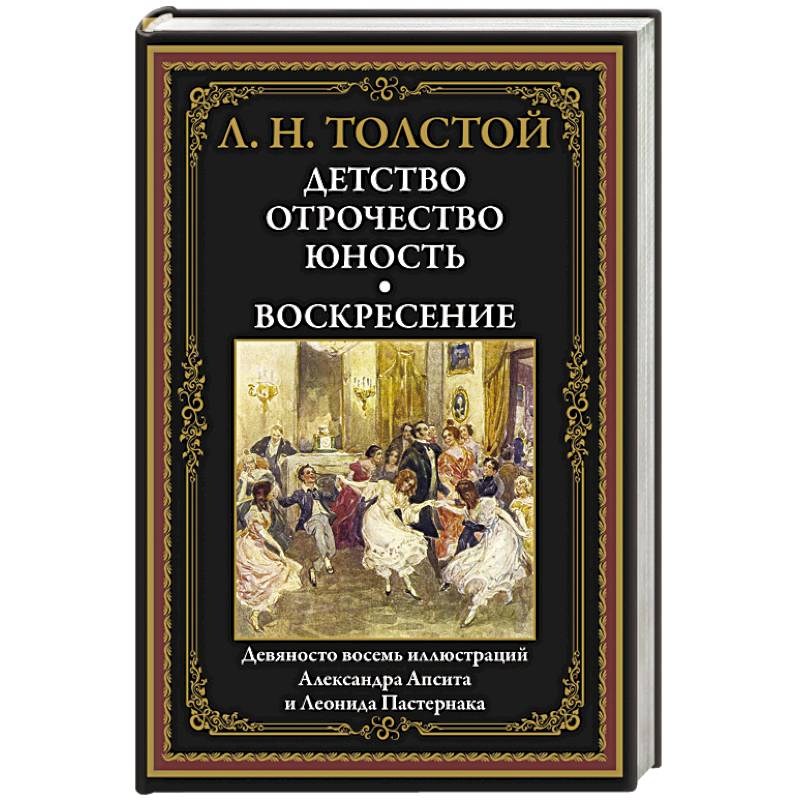Childhood. Adolescence. Youth. Resurrection: a collection
Please sign in so that we can notify you about a reply
The artistic-autobiographical trilogy “Childhood” (1852), “Adolescence” (1854), “Youth” (1857)-literary debut of the classic of world literature Lev Nikolayevich Tolstoy (1828–1910) This is a story about the spiritual ripening of a young contemporary, from a novice writer one could expect either a documentary report on his own fate, or a story about a fictional boy, a teenager and then a young man, but Tolstoy initially complicated the task, taking the figures of real people as a basis (including himself ) and turning them into literary characters. The result exceeded all expectations, the largest writers of that time immediately paid attention to the young author. Dmitry Ivanovich Pisarev claimed: “No one further extends the analysis, no one looks so deep into the soul of a person, no one with such stubborn attention, with such an inexorable sequence, does not understand the most intimate motives, the most passing and, apparently, random movements of the soul” .
Roman Sunday (1889–1899) was the last novel in the bibliography of Tolstoy. It also has a documentary basis - a true case from judicial practice, about which the famous lawyer Anatoly Fedorovich Koni told the author. Working on this work, Lev Nikolaevich deeply analyzed the features of the penitentiary system that existed in the country, carefully studied the prison life, talked a lot with real overseers and convicts, and eventually came to significant and far -reaching conclusions that left the framework of the declared topic. Both colleagues in the writer"s workshop and readers were perceived as a kind of schedule of Tolstoy"s thoughts over modern reality, as the artistic expression of the new worldview of the author. “The non -resistance of evil by violence, the government, the law of the floor, militarism, the death penalty, prison, luxury, class differences, bureaucracy, prejudice, vegetarianism, socialism, land issue, anarchism, nihilism and Christianity are subjected to consideration in the novel, and feelings The author has been brought to the reader with the power with which only a first -class artist can convey them, ”the research researcher of Tolstoy Elmer Mood wrote in an introductory article to the London edition of the novel
Roman Sunday (1889–1899) was the last novel in the bibliography of Tolstoy. It also has a documentary basis - a true case from judicial practice, about which the famous lawyer Anatoly Fedorovich Koni told the author. Working on this work, Lev Nikolaevich deeply analyzed the features of the penitentiary system that existed in the country, carefully studied the prison life, talked a lot with real overseers and convicts, and eventually came to significant and far -reaching conclusions that left the framework of the declared topic. Both colleagues in the writer"s workshop and readers were perceived as a kind of schedule of Tolstoy"s thoughts over modern reality, as the artistic expression of the new worldview of the author. “The non -resistance of evil by violence, the government, the law of the floor, militarism, the death penalty, prison, luxury, class differences, bureaucracy, prejudice, vegetarianism, socialism, land issue, anarchism, nihilism and Christianity are subjected to consideration in the novel, and feelings The author has been brought to the reader with the power with which only a first -class artist can convey them, ”the research researcher of Tolstoy Elmer Mood wrote in an introductory article to the London edition of the novel
Author:
Author:Tolstoy L. N.
Cover:
Cover:Hard
Category:
- Category:Children's Book
- Category:Fiction
- Category:Historical Literature
- Category:Modern Literature
- Category:Poetry & Literature
Publication language:
Publication Language:Russian
Paper:
Paper:Offset
ISBN:
ISBN:978-5-9603-0732-1
No reviews found
